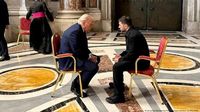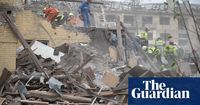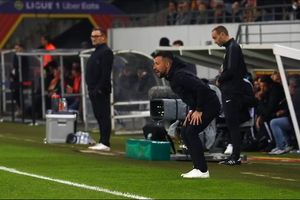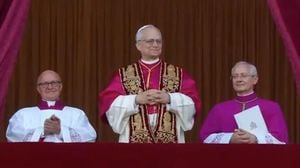In a dramatic turn of events, US President Donald Trump has publicly urged Russian President Vladimir Putin to cease hostilities in Ukraine and engage in peace negotiations. This call for peace comes just a day after Trump met with Ukrainian President Volodymyr Zelenskyy at the funeral of Pope Francis in Rome. During a brief address at Morristown airport on April 27, 2025, Trump expressed his desire for Putin to "stop shooting, sit down, and sign a deal," indicating a push for a US-proposed peace plan aimed at ending the ongoing conflict that has persisted for over three years.
Trump's comments reflect a shift in his administration's approach to the war, which has seen significant casualties and devastation across eastern Ukraine. He remarked, "We have the confines of a deal, I believe, and I want him to sign it," suggesting that he believes a framework for peace already exists. However, Trump did not shy away from expressing skepticism about Putin's willingness to negotiate, stating that he doubts the Russian leader truly desires an end to the war.
The meeting with Zelenskyy marked their first face-to-face interaction since a contentious televised meeting at the White House in February 2025. Following their brief conversation, Trump speculated that Zelenskyy might be prepared to concede Crimea—a territory annexed by Russia in 2014—as part of a peace agreement. When asked if he believed Zelenskyy would give up the peninsula, Trump replied, "Oh, I think so," raising concerns about the implications of such a concession for Ukraine's sovereignty.
While Trump was urging for peace, the situation on the ground in Ukraine remained dire. Just hours after his comments, Russian forces intensified their assault with drone strikes and air raids, resulting in civilian casualties. Reports from the Donetsk region indicated that three people were killed and four injured in airstrikes on Kostiantynivka, while a drone attack in Pavlohrad claimed another life and injured a 14-year-old girl. These attacks underscore the ongoing violence that continues to plague the region despite diplomatic efforts.
US Secretary of State Marco Rubio characterized the upcoming week as "very critical" for American efforts to mediate an end to the conflict. He emphasized the need for a determination on whether the US should continue its involvement in the war, hinting at a potential reevaluation of strategies. Rubio's remarks came in the wake of what was described as a potentially historic meeting between Trump and Zelenskyy, albeit a brief one lasting only 15 minutes.
In a social media post during his flight back to the US, Trump suggested that Russia's continued missile strikes on civilian areas indicate a lack of commitment to peace negotiations. He stated, "There was no reason for Putin to be shooting missiles into civilian areas, cities and towns, over the last few days. It makes me think that maybe he doesn’t want to stop the war; he’s just tapping me along." This sentiment reflects a growing frustration within the US administration regarding Russia's actions.
Meanwhile, Russia's Foreign Minister Sergei Lavrov reiterated Moscow's stance that it would not cease targeting sites used by the Ukrainian military. In an interview, Lavrov claimed that a recent missile strike in Kyiv, which resulted in the deaths of at least 12 individuals, was not aimed at civilian targets. This assertion has been met with skepticism, as the international community continues to condemn Russia's military tactics.
In a separate incident, Ukraine has been accused of orchestrating the assassination of a high-ranking Russian general, Lt Gen Yaroslav Moskalik, who was killed in a car bomb explosion on April 25, 2025. A man named Ignat Kuzin has claimed responsibility, stating he was paid by the Ukrainian security service to carry out the attack. This allegation adds another layer of complexity to the conflict, as Ukraine has yet to respond to these claims, which Russia has framed as evidence of Ukraine's aggressive actions.
In light of the ongoing violence, Zelenskyy has dismissed Russian claims that Ukraine's military has been forced out of the Kursk region, asserting that Ukrainian forces continue to defend the area. He acknowledged that the situation remains challenging but insisted that the current pressure on Russia is insufficient to bring about a resolution to the conflict. Zelenskyy has called for increased international pressure on Moscow, arguing that it could create opportunities for meaningful diplomacy.
As the situation evolves, the international community watches closely, hoping for a breakthrough in negotiations to end the war. However, with both sides entrenched in their positions and ongoing military actions, the path to peace remains fraught with challenges. The coming days and weeks will be crucial in determining whether diplomatic efforts can yield a ceasefire or if the conflict will continue to escalate.
Amidst the turmoil, the question remains: can the US and its allies effectively mediate a resolution to the conflict, or will the cycle of violence persist? As Trump and his administration navigate this complex geopolitical landscape, the stakes are higher than ever for both Ukraine and Russia, as well as for global stability.





